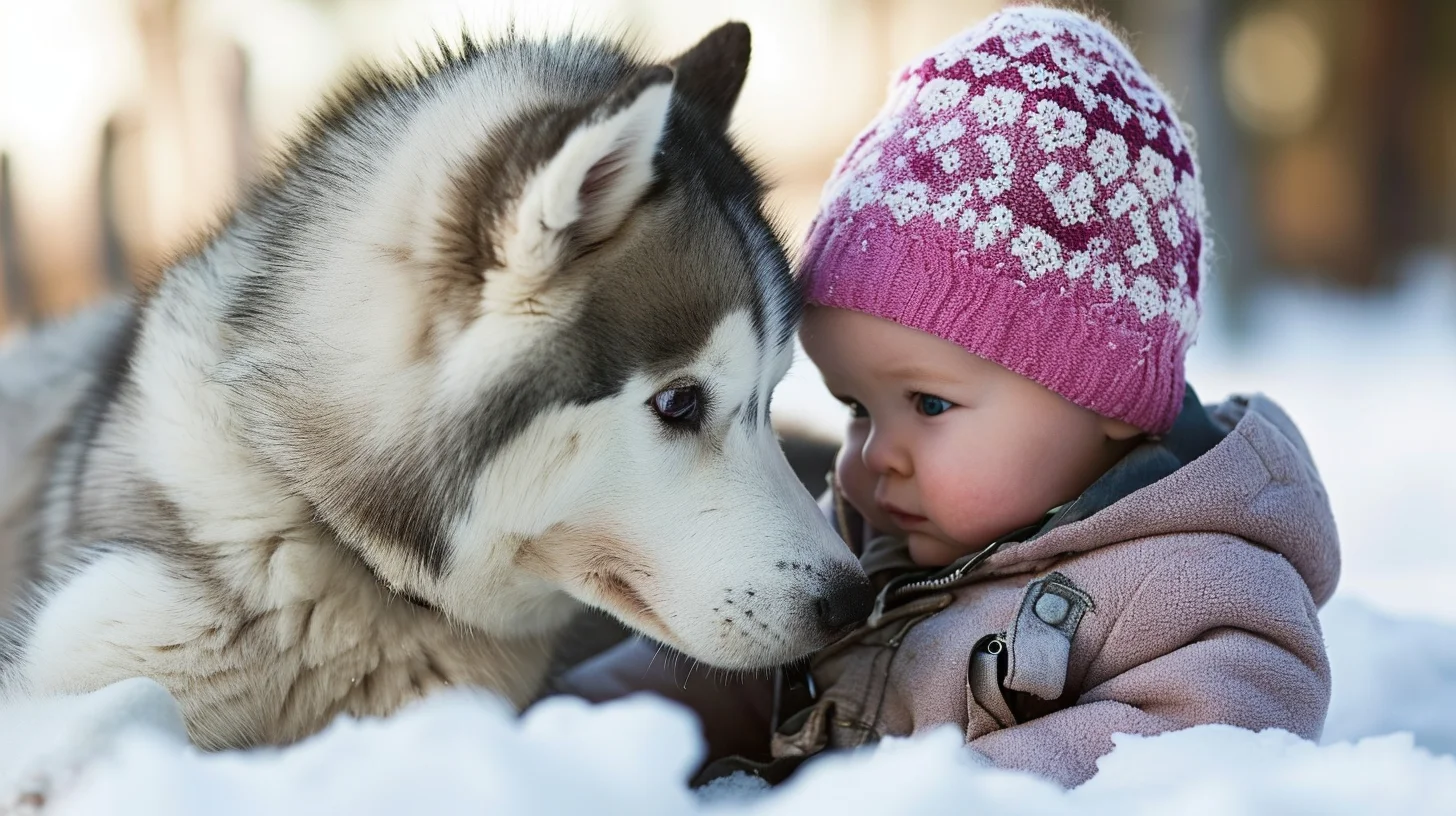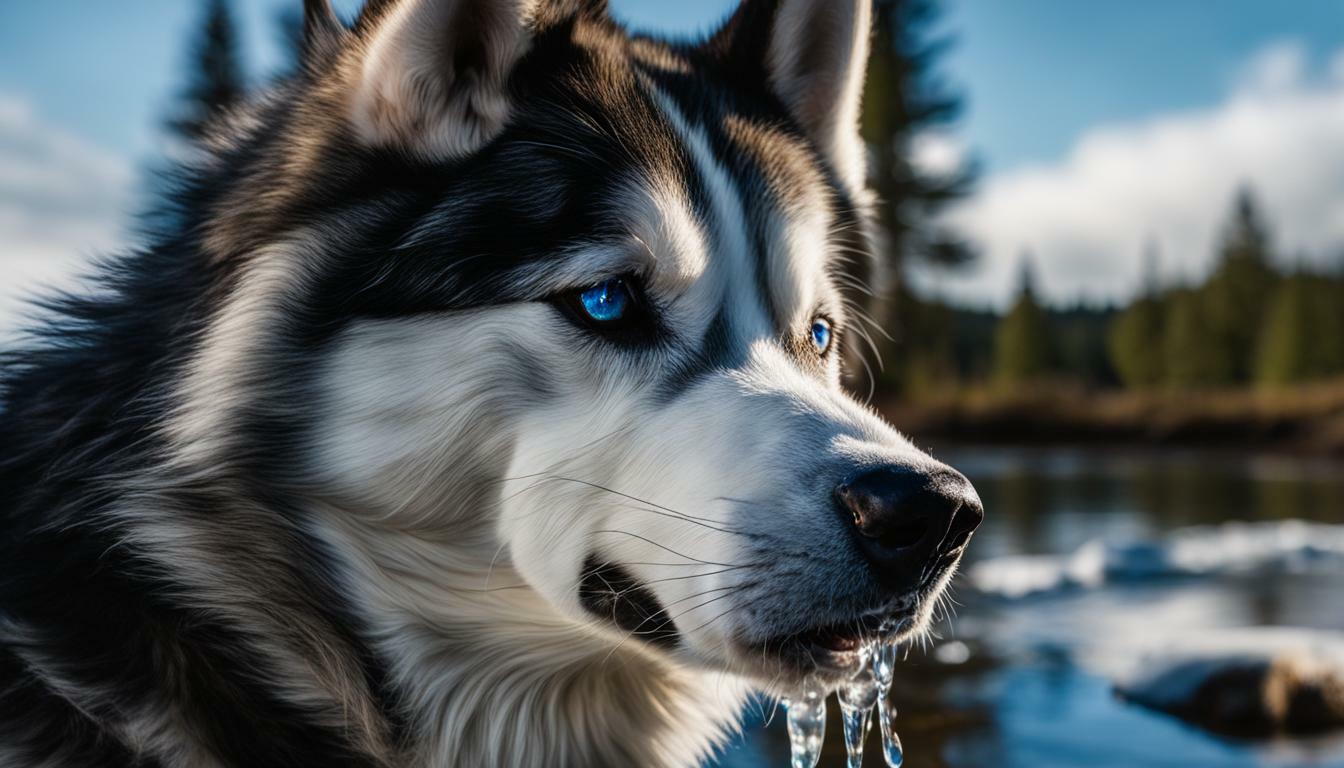Siberian Huskies are known for their striking appearance and friendly demeanor, but it’s essential to be aware of the most common health problems that can affect them. While they are generally a healthy breed, there are certain issues that are more common in Huskies. By understanding these health concerns, prospective owners can take the necessary steps to ensure the well-being of their furry companions.
Key Takeaways:
- Huskies are prone to certain health conditions, including eye problems, hip dysplasia, follicular dysplasia, zinc deficiency, and hypothyroidism.
- Early detection and treatment of these conditions are crucial for maintaining a Husky’s health.
- Proper nutrition, exercise, grooming, and regular vet check-ups are essential in preventing and managing these health problems.
- Choosing a reputable breeder who conducts genetic testing can help reduce the risk of common health issues in Huskies.
Common Husky Eye Conditions
Huskies can be susceptible to various eye conditions, including cataracts, progressive retinal atrophy, corneal dystrophy, and uveodermatologic syndrome. These conditions can affect their vision and overall eye health. It is important for Husky owners to be aware of these issues and understand the signs and symptoms to ensure early detection and proper treatment.
Cataracts, for example, are characterized by the clouding of the lens in the eye, leading to impaired vision. Progressive retinal atrophy is a degenerative disease that affects the retina and can eventually cause blindness. Corneal dystrophy refers to the abnormal growth of the cornea, which can lead to discomfort and vision problems. Uveodermatologic syndrome is a rare autoimmune disorder that affects both the eyes and skin.
Early intervention is crucial in managing these eye conditions. Regular veterinary check-ups, including comprehensive eye exams, can help detect any abnormalities and allow for timely treatment. Treatment options may include medication, surgery, or a combination of both, depending on the specific condition and its severity.
Prevention and Care:
- Keep your Husky’s eyes clean and free from irritants by gently wiping them with a damp cloth.
- Protect their eyes from harsh sunlight and foreign objects, such as dust or debris, by using dog goggles or avoiding potentially dangerous environments.
- Provide a balanced diet rich in vitamins and minerals that promote eye health, such as vitamin A.
- Regular exercise helps maintain overall health and can contribute to better eye health.
Remember, early detection and prompt treatment are key in managing common eye conditions in Huskies. If you notice any signs of eye discomfort or changes in vision, consult your veterinarian right away. By being proactive and providing proper care, you can help ensure your Husky’s eyes stay healthy and their vision remains clear.
| Eye Condition | Symptoms | Treatment Options |
|---|---|---|
| Cataracts | Cloudy or opaque eye lens, impaired vision | Surgery to remove the cataract and restore vision |
| Progressive Retinal Atrophy | Night blindness, dilated pupils, eventual loss of vision | No cure, management of symptoms and support |
| Corneal Dystrophy | Cornea appearing hazy or rough, eye discomfort | Medication to manage symptoms, surgery in severe cases |
| Uveodermatologic Syndrome | Eye inflammation, loss of pigmentation in skin and fur | Immunosuppressive medications to manage symptoms, topical treatments |
Hip Dysplasia in Huskies
Hip dysplasia is a prevalent ailment in Huskies, which can cause pain and mobility issues if not properly addressed. It is a condition in which the hip joint does not develop properly, leading to instability and eventually arthritis. While hip dysplasia can occur in any breed, it is more common in larger dogs like Huskies.
Signs of hip dysplasia in Huskies may include difficulty getting up, lameness, decreased range of motion, and a bunny hopping gait. If you notice any of these symptoms, it’s important to consult with a veterinarian for an accurate diagnosis and appropriate treatment.
Treatment options for hip dysplasia in Huskies can vary depending on the severity of the condition. Mild cases may be managed with weight management, exercise modification, and anti-inflammatory medications. In more severe cases, surgery may be necessary to improve the dog’s quality of life.
Preventing hip dysplasia in Huskies
While hip dysplasia is influenced by genetics, there are steps you can take to reduce the risk of your Husky developing this condition. It is important to choose a reputable breeder who conducts genetic testing to ensure that the parents are not carriers of hip dysplasia. Additionally, providing a nutritious diet, maintaining a healthy weight, and avoiding excessive exercise in puppies can help minimize the risk of hip dysplasia.
| Preventive Measures for Hip Dysplasia in Huskies | Benefits |
|---|---|
| Genetic testing | Reduces the risk of passing on hip dysplasia genes |
| Nutritious diet | Promotes proper bone and joint development |
| Maintaining a healthy weight | Reduces stress on the hip joints |
| Avoiding excessive exercise in puppies | Allows for proper growth and development |
By understanding and addressing the common health problems in Huskies, like hip dysplasia, you can ensure the well-being of your furry friend. Regular veterinary check-ups, a balanced diet, appropriate exercise, and good grooming practices are all essential in keeping your Husky healthy and happy for years to come.
Follicular Dysplasia and Zinc Deficiency in Huskies
Huskies may be prone to follicular dysplasia and zinc deficiency, which can lead to skin and coat problems if not managed properly. These conditions can cause hair loss, dry and flaky skin, and a dull coat. It is important to understand the symptoms and take appropriate measures to prevent and treat these issues.
Follicular dysplasia is a genetic condition that affects the hair follicles, resulting in abnormal hair growth or hair loss. Zinc deficiency, on the other hand, occurs when a Husky’s diet lacks sufficient amounts of this essential mineral. Zinc is crucial for maintaining healthy skin and coat.
To address follicular dysplasia and zinc deficiency, it is recommended to consult with a veterinarian who can provide guidance on appropriate dietary supplements and treatments. A balanced diet that includes foods rich in zinc, such as meat, poultry, fish, and legumes, can help prevent zinc deficiency. Regular grooming, including brushing and bathing, can also promote a healthy coat and skin.
| Follicular Dysplasia | Zinc Deficiency |
|---|---|
|
|
Regular visits to the veterinarian can help monitor and manage these conditions. Additionally, maintaining a clean and comfortable living environment for your Husky, free from irritants and allergens, can further contribute to their overall skin and coat health.
Hypothyroidism in Huskies
Hypothyroidism is a frequently occurring health issue in Huskies, affecting their metabolism and overall well-being. This condition occurs when the thyroid gland, located in the neck, fails to produce enough thyroid hormone. As a result, Huskies with hypothyroidism may experience weight gain, lethargy, hair loss, and skin problems.
Early detection and proper treatment are essential in managing hypothyroidism. Regular veterinary check-ups can help monitor a Husky’s thyroid function and identify any potential issues. Your veterinarian may perform blood tests to assess thyroid hormone levels and develop an appropriate treatment plan.
Treatment for hypothyroidism usually involves lifelong hormone supplementation. Medications, such as synthetic thyroid hormone, are prescribed to replace the hormones that the thyroid gland is not producing adequately. With proper medication and monitoring, Huskies with hypothyroidism can lead happy and healthy lives.
| Signs of Hypothyroidism in Huskies: | Treatment Options: |
|---|---|
| Weight gain | Hormone supplementation |
| Lethargy | Regular veterinary check-ups |
| Hair loss | Blood tests to monitor thyroid function |
| Skin problems | Lifelong medication |
- Monitor your Husky’s weight and overall energy levels. If you notice any unexplained weight gain or lethargy, consult your veterinarian.
- Pay attention to any changes in your Husky’s coat, such as hair loss or skin problems. These could be signs of an underlying thyroid issue.
- Stay consistent with regular veterinary check-ups to monitor your Husky’s thyroid function and catch any potential health problems early on.
- Ensure your Husky receives proper nutrition and exercise to support their overall health and well-being.
When looking for a Husky, it’s important to choose a reputable breeder who conducts genetic testing to reduce the risk of common health issues, including hypothyroidism. Responsible breeding practices can help minimize the occurrence of these conditions in the breed.
Remember, early detection and proper treatment are key in managing hypothyroidism in Huskies. By staying vigilant and providing the necessary care, you can ensure your Husky leads a happy and healthy life.
Importance of Regular Vet Check-ups
Regular vet check-ups are crucial for Huskies to detect and address any potential health problems early on. These routine examinations allow veterinarians to assess your dog’s overall health and identify any signs of illness or underlying conditions that may require treatment. By monitoring your Husky’s health regularly, you can ensure they receive the necessary care to maintain their well-being.
During a vet check-up, the veterinarian will perform a comprehensive physical examination, checking your Husky’s eyes, ears, teeth, and overall body condition. They may also recommend additional tests, such as blood work or X-rays, to further evaluate your dog’s health.
In addition to regular check-ups, it’s important to prioritize proper nutrition, exercise, and grooming for your Husky. A balanced diet tailored to their specific needs can help prevent certain health issues and promote overall vitality. Regular exercise, such as daily walks or playtime, not only keeps your Husky physically fit but also helps stimulate their mind. Regular grooming sessions, including brushing their coat and cleaning their ears, can prevent skin problems and maintain good hygiene.
| Regular Vet Check-up Benefits: |
|---|
| Early detection and treatment of health problems |
| Monitoring overall health and well-being |
| Professional advice on nutrition and exercise |
| Prevention and control of parasites |
By prioritizing regular vet check-ups, proper nutrition, exercise, and grooming, you can ensure your Husky leads a healthy and happy life. Remember to choose a reputable breeder who conducts genetic testing to reduce the risk of common health problems in Huskies. With proper care and regular attention to their health, your Husky can thrive and enjoy a long, active, and fulfilling life by your side.
Choosing a Reputable Breeder
When choosing a Husky, it is advisable to select a reputable breeder who conducts thorough genetic testing to minimize the risk of common health issues in this breed. Genetic testing helps identify potential health concerns, allowing responsible breeders to make informed decisions and breed healthier puppies. By choosing a reputable breeder, you are taking an important step towards ensuring the long-term health and well-being of your new furry friend.
A reputable breeder prioritizes the health of their Huskies and takes steps to prevent breeding dogs with known genetic health conditions. They perform various genetic tests on their breeding dogs to screen for specific health problems that are prevalent in the Husky breed, such as cataracts, progressive retinal atrophy, corneal dystrophy, and uveodermatologic syndrome. These tests help identify dogs that may be carriers of certain genetic mutations, allowing breeders to make informed breeding decisions and reduce the risk of passing on these conditions to their puppies.
By working with a reputable breeder, you can have peace of mind knowing that your Husky puppy has a lower likelihood of developing common health issues. Reputable breeders also provide proper care for their dogs, ensuring they are well-nourished, properly exercised, and receive regular veterinary check-ups. They prioritize the overall well-being of their Huskies and are committed to producing healthy and happy puppies.
Remember, a reputable breeder will be transparent and open to answering any questions you have about the health and genetics of their dogs. They will provide you with information about the specific genetic tests performed and the health history of the breeding dogs. Taking the time to find a reputable breeder who conducts genetic testing is an investment in your Husky’s long-term health and can help you avoid potential heartache and costly veterinary bills down the road.
Ensuring a Healthy Husky
To ensure a healthy and happy Husky, it’s important to provide them with proper nutrition, regular exercise, and adequate grooming, in addition to regular vet check-ups. Huskies have specific needs that require attention and care to prevent common health ailments.
Nutrition plays a vital role in maintaining a Husky’s overall health. A balanced diet should include high-quality dog food that is rich in protein, vitamins, and minerals. Consult with your vet to determine the right amount and type of food for your Husky, taking into consideration their age, weight, and activity level. Avoid overfeeding, as Huskies are prone to weight gain, which can lead to joint problems like hip dysplasia.
Regular exercise is essential for keeping your Husky fit and mentally stimulated. These energetic dogs require daily physical activities such as walks, runs, and play sessions. Engaging in interactive games like fetch or agility training can help satisfy their natural instincts and prevent boredom. A well-exercised Husky is less likely to develop behavioral problems and will have a healthier cardiovascular system.
| Key Points for Ensuring a Healthy Husky |
|---|
| Provide a balanced diet rich in protein and nutrients. |
| Monitor your Husky’s weight to prevent obesity. |
| Engage your Husky in daily exercise and mental stimulation. |
| Maintain a regular grooming routine to prevent skin and coat issues. |
| Keep up with regular vet check-ups and vaccinations. |
Proper grooming is another essential aspect of Husky care. Their thick double coat requires regular brushing to prevent matting and shedding. Additionally, regular nail trimming, ear cleaning, and dental care are necessary to maintain their overall hygiene. A well-groomed Husky not only looks good but also reduces the risk of skin irritations and infections.
Finally, regular vet check-ups are crucial for the early detection and prevention of common Husky health issues. Schedule routine veterinary visits for vaccinations, deworming, and overall health assessments. Your vet can also provide guidance on specific health concerns related to Huskies, such as eye conditions and joint problems.
Conclusion
Being aware of the typical health problems that Huskies may encounter is crucial for their well-being and longevity. While Huskies are generally a healthy breed, there are certain issues that are more common in this beloved breed. Cataracts, progressive retinal atrophy, corneal dystrophy, uveodermatologic syndrome, hip dysplasia, follicular dysplasia, zinc deficiency, and hypothyroidism are some of the health concerns that Huskies may face.
To ensure the health and well-being of your Husky, it is important to schedule regular vet check-ups. Early detection of these conditions can lead to prompt treatment and better outcomes. Additionally, proper nutrition, regular exercise, and routine grooming are essential in keeping your Husky healthy and happy.
When considering getting a Husky, it is advisable to choose a reputable breeder who conducts genetic testing to reduce the risk of these common health problems. Responsible breeding practices and genetic screening can significantly lower the chances of your Husky developing these ailments.
By understanding and addressing the most common health problems in Huskies, you can ensure that your furry friend enjoys a long, happy, and healthy life. Stay informed, prioritize their well-being, and provide them with the love and care they deserve.
What are the potential health issues that could be causing my husky’s dry, itchy skin?
Dry itchy skin remedies for huskies can help alleviate potential health issues such as allergies, parasites, or hormonal imbalances. Regular grooming, a balanced diet, and proper hydration are essential for maintaining your husky’s skin health. Consult a veterinarian for an accurate diagnosis and personalized treatment plan.
FAQ
Q: What are the most common health problems in Siberian Huskies?
A: The most common health problems in Siberian Huskies include cataracts, progressive retinal atrophy, corneal dystrophy, uveodermatologic syndrome, hip dysplasia, follicular dysplasia, zinc deficiency, and hypothyroidism.
Q: How can I detect these health conditions early?
A: Regular vet check-ups are important for early detection of health conditions in Huskies. Your veterinarian can perform necessary tests and provide appropriate treatment if any issues are detected.
Q: What can I do to keep my Husky healthy?
A: Proper nutrition, exercise, and grooming are essential for maintaining the health of your Husky. Ensure they have a balanced diet, regular physical activity, and regular grooming sessions to keep their coat and skin healthy.
Q: How can I reduce the risk of health problems when choosing a Husky?
A: It is advisable to choose a reputable breeder who conducts genetic testing to reduce the risk of these health issues. Responsible breeding practices and genetic screening can help ensure you get a healthier Husky.




